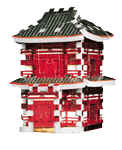Japanese Pagoda

test
It is very difficult at first sight, to distinguish between a Buddhist Temple and a Shinto Sanctuary. The presence of a Torii, a large wooden or brick portico in the form of an immense perch destined for the village's sacred rooster is found in sanctuaries. The architectural style of Buddhist Temples is more apt to make one think of China. The pagodas, in their sobriety, blend in harmoniously with nature. Their tiled or shingled roofs curl in at the top and flare out towards the bottom. The painted and lacquered wooden temples are often sculpted and one can always find a pavilion in which to worship Buddha. Inside, He sits "Indian-style", with eyes half-closed, inviting the visitor to meditate. The statues, sculptures and different works that decorate these temples, some that date back more than a thousand years, are among the lands most precious artistic treasures.
